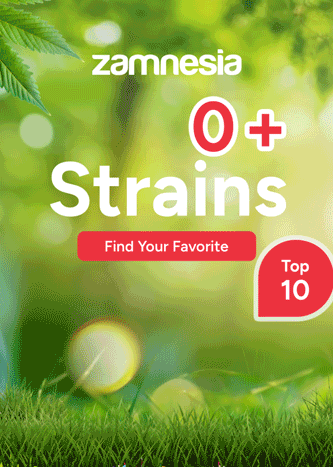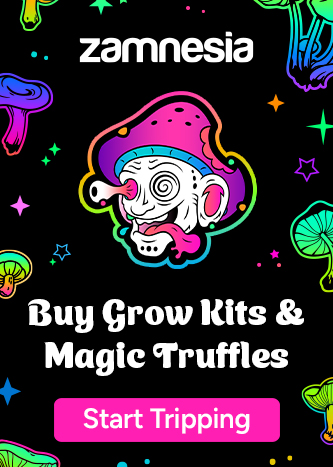4 ways cannabis is helping the fight against aging
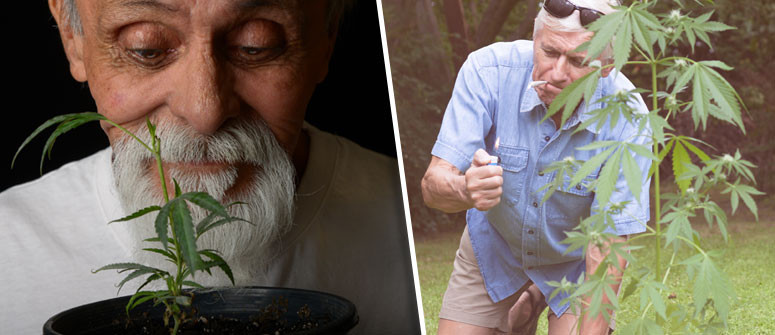
A ton of research is going into cannabis and how it can help us live longer, healthier, and happier lives. In this article, we explore 4 ways cannabis could help fight the signs of aging.
More and more research is going into cannabis, meaning we’re learning fascinating new things about this plant almost on a daily basis. One aspect of cannabis that’s gotten a lot of attention recently are the many medicinal benefits it poses, such as its anti-inflammatory and painkilling properties, as well as its potential to protect against neurodegeneration.
So can cannabis really help you combat both the physical and mental symptoms of age-related conditions?
1. CANNABIS MIGHT DELAY BRAIN AGING
In 2015, a study showed that cannabinoids might be able to restore cognitive function in aging brains.[1] The study, published in the Nature Medicine journal, examined the effects of THC on the brains of old mice.
There’s a theory that the endocannabinoid system (ECS) is involved in aging and the decline of brain function. Scientists have noted that as we get older, activity in the ECS slows down, essentially producing fewer endocannabinoids.
While the process isn’t fully understood, scientists have hypothesized that this could play a role in the negative effects of aging.
Based on this theory, the scientists decided to examine the effects cannabinoids had on aging brains, and whether they could help reverse some of the effects of cognitive decline. And it seems they can; the study found that a small dose of THC reversed the age-related decline in cognitive performance of mice aged 12 and 18 months.
More specifically, the scientists noted that small doses of THC caused big changes to genes in the hippocampus (one of the key players in short and long-term memory). In fact, the scientists noted that the genetic transcription patterns of the hippocampus in the THC-treated mice (aged 12 months) closely resembled those of mice aged 2 months.
They noted, however, that the key to unlocking the potential benefits of THC were CB1 receptors. If these receptors are inhibited, they essentially block the effectiveness of THC. Hence, the authors of the study concluded that restoring CB1 receptors in older individuals may be an effective way to treat age-related cognitive impairment.
2. CANNABIS CAN HELP WITH INFLAMMATION AND PAIN
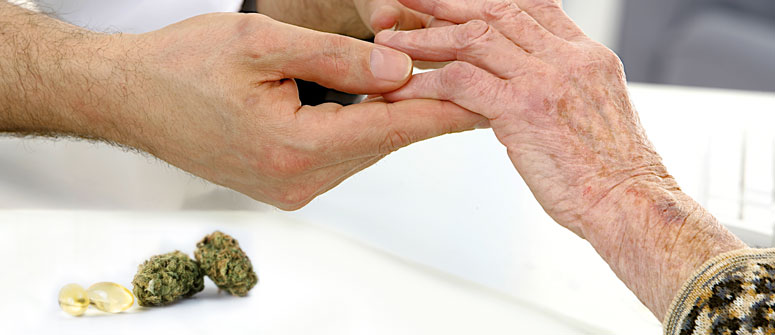
Inflammation and chronic pain are very common symptoms of old age. Arthritis is a condition characterized by chronic inflammation and is extremely common among elderly people. In the US, close to 50% of people ages 65+ have been diagnosed with arthritis by their doctor.[2] Plus, the general wear and tear on our body can cause pain as we age too.
Today, we know that the endocannabinoid system plays a key role in managing pain. The two main receptors of the ECS (CB1 and CB2) have both been shown to affect neurotransmission in the brain and, when agonized/antagonized by cannabinoids, can positively affect the sending of pain signals across the brain and body.
Both THC and CBD, the two most abundant cannabinoids found in cannabis, display powerful painkilling properties across numerous studies. By acting on either CB1 or CB2 receptors, both compounds have the ability to temporarily numb pain signals.
Cannabinoids like THC and CBD have been noted for being especially successful at managing neuropathic pain. Neuropathic pain is often caused by neurological conditions like multiple sclerosis and aggressive treatments such as chemotherapy.
Thanks to its analgesic and anti-inflammatory properties, cannabis can help elderly patients deal with the common symptoms of old age, and other conditions like arthritis that can cause compounding pain and inflammation.
3. CANNABIS IS A NEUROPROTECTANT
Neurological health is extremely important when we get older. There’s a wide variety of conditions (Parkinson’s, Alzheimer’s, Huntington’s, and others) which attack brain cells and cause a gradual, often fatal, decline in our body’s functioning. Many of these diseases are more common in elderly people or get worse with old age.
Luckily, just like we know that the endocannabinoid system is involved in pain management, we also know that it's involved in maintaining brain health. Studies have shown that endocannabinoid system activity increases after brain injury.
A 2002 study by Raphael Mechoulam and other researchers showed that the production of anandamide and 2-AG (two endocannabinoids produced naturally by the brain) increases after brain injury, and that the production of these compounds helped inhibit the production of other compounds known to cause neural damage.[3]
Another study by Mechoulam published that same year showed that the induction of 2-AG and anandamide helped reduce brain damage in mice.[4] The production of these endocannabinoids helped reduce oedema (the accumulation of fluid leading to swelling), tissue necrosis, and cell death in the hippocampus.
Further studies have shown similar results for phytocannabinoids found in the cannabis plant (like THC and CBD). A growing body of research displays that these compounds can help protect brain cells and therefore, may help in the treatment and/or management of neurodegenerative diseases like Parkinson’s, Alzheimer’s, prion diseases, Huntington’s, and others, which often affect aging populations disproportionately.
4. CANNABIS FOR A YOUNGER SKIN
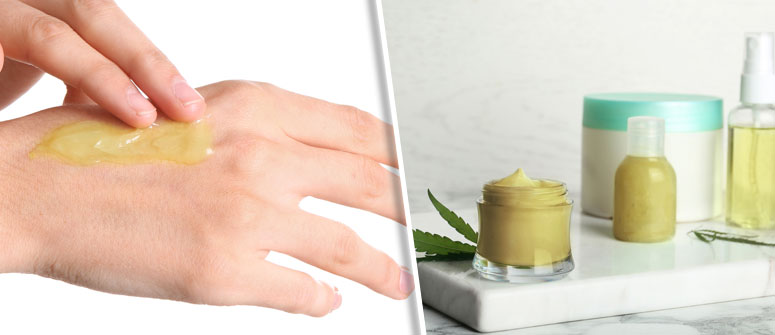
Besides helping prevent age-related diseases like those we mentioned above, several compounds in cannabis have also been shown to improve overall skin health and nowadays, there are several cannabis topicals available that can be used for many different purposes.
As we age, our skin becomes dry, loses elasticity, and can also lose its ability to heal after suffering from wounds or skin conditions. Today, we know that there are a wide variety of compounds in the cannabis plant that can help improve skin health and ultimately protect against some of the symptoms of aging.
Hemp seed, for example, contains high levels of essential fatty acids like omega-6 and omega-3. Both of these oils have been shown to improve skin health in a number of ways.[5] They can help reinforce and smooth the skin’s surface, increase skin hydration, calm redness and sensitivity, and provide a healthy dose of antioxidants that can visibly help reduce the signs of aging.
We’ve already mentioned the anti-inflammatory properties of cannabinoids CBD. And much like they can help reduce inflammation internally, studies suggest that these compounds can also help combat skin diseases like eczema and dermatitis.
A 2017 article published in The Journal of The American Academy of Dermatology, for example, referenced numerous studies that show how topical creams containing cannabinoids can help relieve pruritus, itching, and other dermatological conditions.[6]
- ^ Nature, A chronic low dose of Δ9-tetrahydrocannabinol (THC) restores cognitive function in old mice, retrieved November-30-2018
Link - ^ Centers for Disease Control and Prevention, Arthritis-Related Statistics, retrieved November-30-2018
Link - ^ Science Direct, Cannabinoids and brain injury: therapeutic implications, retrieved November-30-2018
Link - ^ Science Signaling, Endocannabinoids and Neuroprotection, retrieved November-30-2018
Link - ^ Oregon State University, Essential Fatty Acids and Skin Health, retrieved November-30-2018
Link - ^ Journal of the American Academy of Dermatology, The role of cannabinoids in dermatology, retrieved November-30-2018
Link
